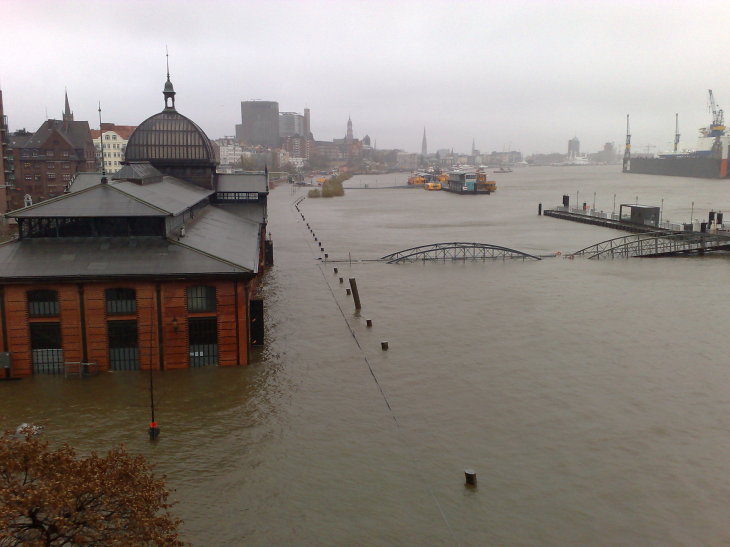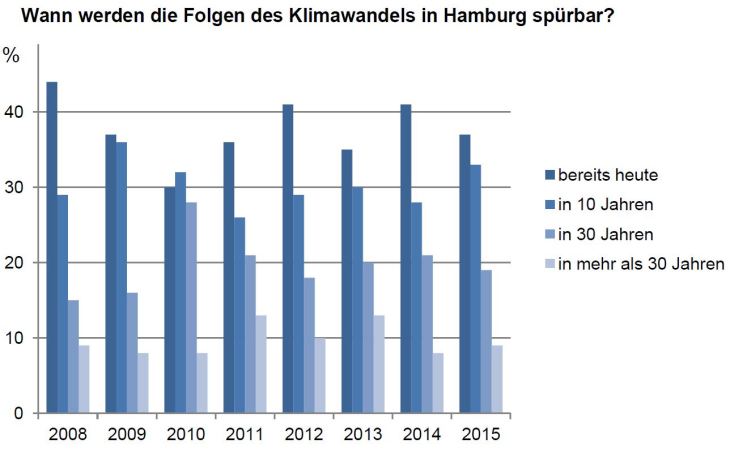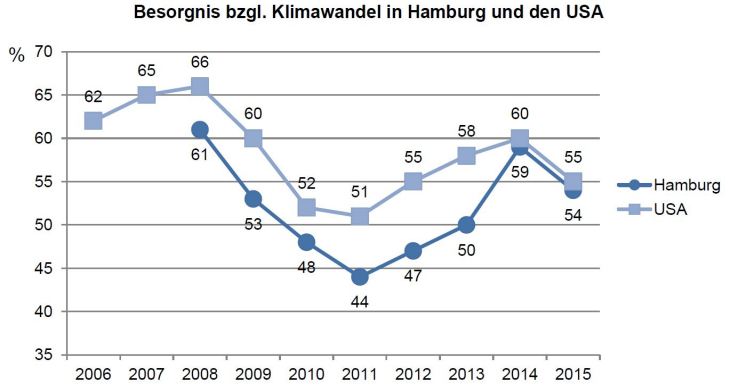Winter storms influence climate change perception in Hamburg

Hamburg Fischmarkt flooded during a storm surge
For the eighth year in a row, scientists from the Institute of Coastal Research at the Helmholtz-Zentrum Geesthacht carried out a survey through the Forsa Institute in which they queried 501 Hamburg residents on their perceptions of climate change. The survey was carried out in 2015 through telephone interviews and the data was evaluated with the results from previous years, current weather events and similar surveys of US residents in mind.
This year’s questionnaire showed that Hamburg residents perceive overall climate change risk as somewhat less threatening for the city. In 2008, 17% of those surveyed viewed climate change as a very serious threat and 44% as a serious threat. The results this year were only 12% and 42% respectively. The respondents’ personal level of concern has, however, increased slightly. Approximately half of the Hamburg residents surveyed who view climate change as a very serious or serious threat believe in the possibility that they will personally be affected by natural catastrophes such as storm floods, storms, heat waves or heavy rain.
The results look different when respondents were asked about the temporal dimension of climate change effects in Hamburg. A clear majority of those questioned since 2011 already sense noticeable effects of climate change today and do not believe these effects will be felt merely in the future. This trend becomes less pronounced for the first time in 2015: of those residents surveyed who believed climate change was a threat for Hamburg, only 37% felt the consequences of climate change were noticeable even today. In 2014, 41% of the respondents in this group felt consequences were already noticeable. In contrast, 33% of those surveyed expect to see consequences in the next ten years, as opposed to only 28% in 2014.

Today, less people than in previous years believe that the consequences of climate change are felt in Hamburg today. The number of those who expect tangible consequences within the next ten years has, however, increased.
Winter storms affect risk awareness of Hamburg citizens
The numerous storms last winter have affected Hamburg residents’ climate change risk awareness. According to the results of this year’s telephone survey, concern over storms as the most serious natural disaster related to climate change for Hamburg has risen in comparison to previous years. “It is remarkable the number of people between the ages of thirty and forty-four who perceive storms as the most severe threat to Hamburg,” says Dr. Beate Ratter, lead scientist of the study. “This number has doubled proportionally since 2014, from 11% to 22%.” Overall, the natural disasters considered to inflict the most severe consequences for Hamburg are still storm surges and floods.
Hamburg residents' perceptions fluctuate as do those in the United States
When comparing the survey results from this year to those of previous years, it has again become clear that the development of climate change perceptions among Hamburg residents is generally subject to cyclical fluctuations. After a high point regarding awareness in 2008 and a low point in 2011, it appears that another high point in 2014 has just passed again.
“A similar trend is apparent in American survey results,” Ratter claims. “After an increase of climate change awareness from 2011 to 2014 in the US, residents there also consider it less of a threat in 2015.” The values sank by five percentage points in 2015 in both regions surveyed. “The hype after the latest IPCC World Climate Report publication in 2014 has already died down and issues other than climate change come to the foreground for the general population,” explains Ratter in reference to this year’s survey results.

A comparison of results from Hamburg with US survey results shows similar cyclical fluctuations of the climate change awareness.
You can access the detailed survey results in the study’s report: “Climate Change Risk Awareness: Hamburg Residents 2015.” [German only] “Climate Change Risk Awareness: Hamburg Residents 2015.” [German only]
Contact

Phone: +49 (0)4152 87-1527
E-mail contactHelmholtz-Zentrum Geesthacht
